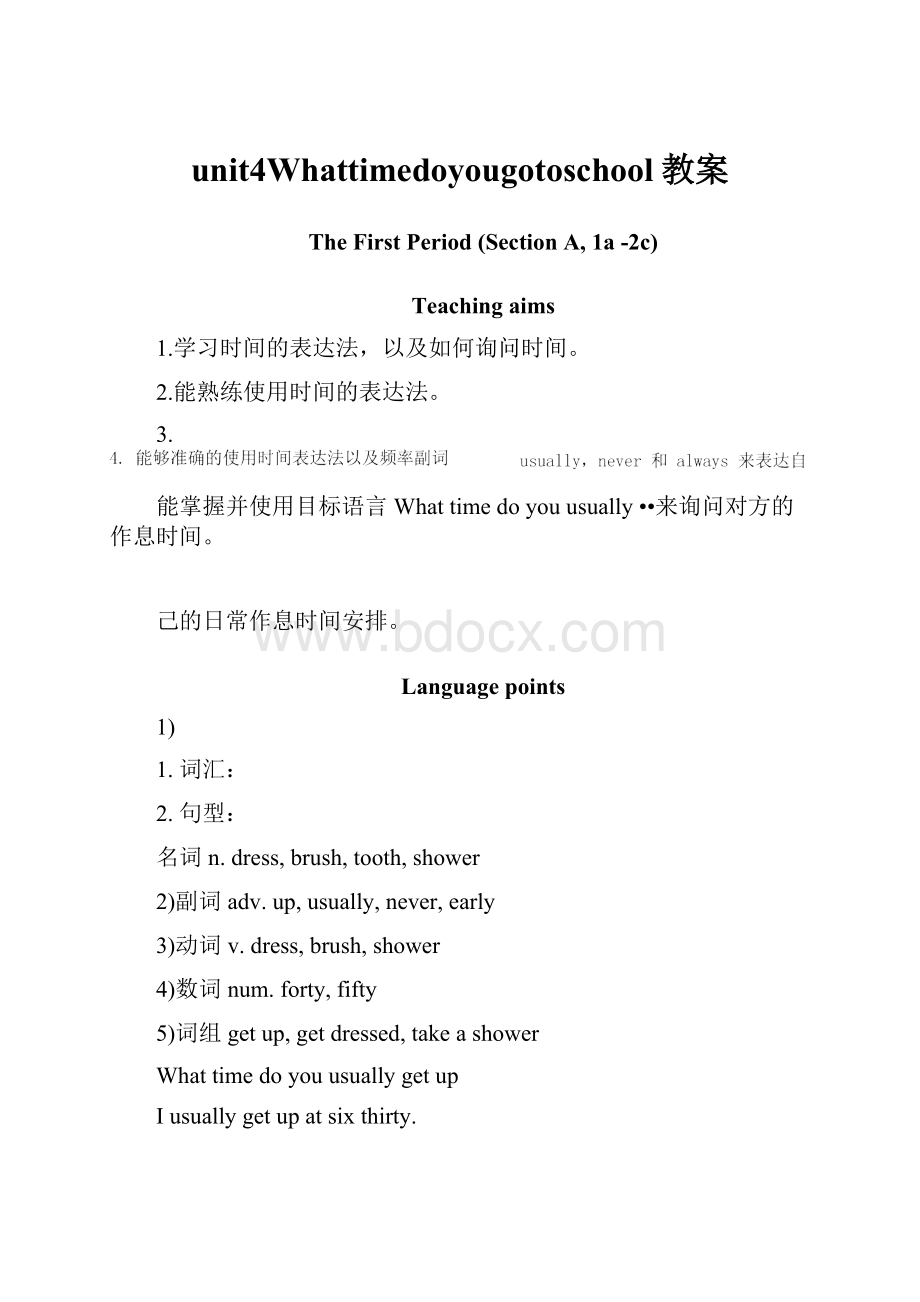unit4Whattimedoyougotoschool教案.docx
《unit4Whattimedoyougotoschool教案.docx》由会员分享,可在线阅读,更多相关《unit4Whattimedoyougotoschool教案.docx(14页珍藏版)》请在冰豆网上搜索。

unit4Whattimedoyougotoschool教案
TheFirstPeriod(SectionA,1a-2c)
Teachingaims
1.学习时间的表达法,以及如何询问时间。
2.能熟练使用时间的表达法。
3.
能掌握并使用目标语言Whattimedoyouusually••来询问对方的作息时间。
己的日常作息时间安排。
Languagepoints
1)
1.词汇:
2.句型:
名词n.dress,brush,tooth,shower
2)副词adv.up,usually,never,early
3)动词v.dress,brush,shower
4)数词num.forty,fifty
5)词组getup,getdressed,takeashower
Whattimedoyouusuallygetup
Iusuallygetupatsixthirty.
Difficulties
1.时间的表达法,即顺读法和逆读法。
2.频率副词的正确使用。
3.目标语言的熟练操练。
Teachingsteps
1.Warm-upandrevision
1)DailygreetingstotheSs.
(2)Revision(复习):
Anumbergame.
T:
Let'splayanumbergame.Wewillsaythenumbersoutloudtogether.Whenyoureachseven,seventeen,seventyorthemultiplesofseven,youshouldclapyourhandsinsteadofsayingthenumber.
教学设计说明】本课时第一个要解决的问题是时间的表达法,必然会用到学过的数词,因此本环节热身既能唤醒学生的记忆又能使所有的学生在第一时间参与到课堂活动中来。
2.Presentation
(1)Presentsomepicturesofclocks.TeachSshowtosaythetime.
T:
Look,whattimeisit
Ss:
It'ssix/sixthirty/seven/seventhirty/eighto'clock,etc.TeachSshowtousewhattime/o'clock.
HaveSspracticesayingthem.
(2)Presentsomepicturesofactivitiesin1a.HelpSstounderstandthesenewphrases:
getup,gotoschool,getdressed,brushteeth,eatbreakfast,takeashower.
教学设计说明】图片教学法是呈现新知识最简单有效的方法之一,学生通过图片,能更价值观的理解新单词的含义。
3.Workon1a
(1)Matchtheactivitieswiththepictures.
(2)Checktheanswers.
教学设计说明】通过1a的练习,使学生进一步理解新短语的意思。
4.Workon1b
1)Listenandmatchthetimeswiththeactions.Drawlinesfromtheclockstothepictures.
(2)Checktheanswerslikethis:
T:
NowyouareRickandIamtheinterviewer.
Whattimedoyouusuallygetup/gotoschool/getdressed/brushyour
teeth/eatbreakfast/takeashower
S:
Iusually--at…
教学设计说明】此环节着重是听力训练。
让学生在听对话的过程中抓住关键词汇,由于前面已做了一些训练,因此学生听起来比较容易,让他们都有一次成功的喜悦和感受,这样可以增强他们的学习自信心。
5.Workon1c
1)StudentAistheinterviewer.StudentBisRick.AskandanswerquestionsaboutRick'sday.
A:
Whattimedoyouusuallytakeashower,Rick
B:
Iusuallytakeashoweratsixforty.
(2)Havesomepairspresenttheirconversationstotheclass.
教学设计说明】此环节是让学生运用所学句型来进行操练,有利于巩固所学句型。
6.Workon2a&2b
T:
Pleaseturntopage8.
T:
Nowlet'slistentotheconversationandcompletethesentences.
T:
CanyougettheanswersPleasechecktheanswers.
T:
Pleaselookat2b.I'llplaytheconversationonceagain.CompletetheshowerscheduleforJim'sfamily.
T:
WhattimedoesBobtakeashower
S:
Heusuallytakesashowerat5:
30.
教学设计说明】此环节进一步巩固了本堂课所学的词汇和句型。
通过反复听读,可以让学生尽快熟悉生词。
学生填表格,是检查学生能否听懂并拼写所学的时间表达法。
7.Workon2c
Askandanswerquestionsaccordingyourday.
A:
Whattimedoyouusually…
B:
Iusually…at…
A:
Ialways…at…
B:
Inever…so…
教学设计说明】此环节是让学生运用所学句型来进行情境操练,既能操练目标语言又能增进学生之间的相互了解。
8.Homework
Oral:
1.朗读并熟记第19页的单词和句子。
2.背诵2a听力材料。
Written:
抄写单词up---exercise
TheSecondPeriod(SectionA,2-3d)
Teachingaims
1.能在日常情境中谈论日常作息时间。
2.能用所学内容解决实际问题。
3.学会使用第三人称操练目标语言。
4.学习并区别频率副词always,usuallyandnever.
Languagepoints
1.词汇:
1)名词n.job,work,station,night,exercise,group
2)形容词adj.funny,best
3)副词adv.o'clock,best
4)短语onweekends
2.句型:
Whattimedoyouusuallygettoschool
Iusuallygetupatsixthirty.
Whattimedotheygetdressed
Theyalwaysgetdressedatseventwenty.
WhendoesScottgotowork
Healwaysgoestoworkatseveno'clock.He'sneverlate.
Difficulties
1.目标语言的第三人称的使用。
2.频率副词的使用。
Teachingsteps
1.Warm-upandrevision
一人用bodylanguage
1)屏幕打出下列单词或词组,以组为单位派出两名同学,
表演,一人用英语猜,看谁在1分钟内猜对的多,哪组胜利,发奖品。
1.gotoschool
9.gohome
17.playthedrums
2.getup
10.eatlunch
18.playvolleyball
3.run
11.watchTV
19.writestories
4.eatbreakfast
12.playbasketball
20.sing
5.takeashower
13.playchess
21.dance
6.gotobed
14.playtheviolin
22.swim
7.doone'hsomework
15.playthepiano
23.playtennis
8.eatdinner
16.playtheguitar
24.speakEnglish
2)HaveSsdoasurveybyaskingandansweringquestionsandfillinginthe
chart.
3)HaveSstalkabouttheirdailyroutines.
教学设计说明】通过使用bodylanguage来进行活动短语的复习,一方面可以让学生形象的复习学过的短语,同时大大增加了趣味性,能很好的提升学习本节课的学习兴趣和课堂参与率。
2.Presentation
(1)ShowMissLi'sscheduletoSs.ThentalkaboutMissLi'sdailyroutine.
clock.
A:
Whattimedoessheusuallygetup
B:
Sheusuallygetsupateighto
(2)Lookatthepictures,andtalkaboutWangHai'sactivities.
T:
Pleaselookatthepictures,andaskyourclassmatesquestionsabout
WangHai'sday.
A:
WhattimedoesWangHaiusually
B:
Healways…at…
教学设计说明】通过谈论MissLi的日常作息时间,来学习和练习第三人称的使用。
通过小测试来考察第三人称的使用以及第一课时中新短语掌握情况。
3.Workon2d
1)Readtheconversationandanswerthefollowingquestions.
Q1.WheredoesScottwork
Heworksataradiostation.
Q2.Whattimedoesheusuallygetup
Heusuallygetsupateightthirtyatnight.
Q3.Ishealwayslateforwork
No,he'sneverlateforwork.
in
(2)Role-playtheconversationin2d.
(3)HaveSstalkaboutsomeonetheyknowinpairs,usingtheconversation
2dasanexample.
教学设计说明】学生通过回答问题能理解对话的内容,通过角色扮演能在情境中学会运用,通过自编对话能更好的让学生学以致用。
4.GrammarFocus
(1)Readthroughthesentences.
(2)AskSstofocusonusually,neverandalways.
【教学设计说明】本部分为本单元的内容核心,不仅概括了本单元的重点,还将基
本句型一一呈现。
通过句子的罗列,使学生关注人称的变化。
因此不应小视,
但由于是总结性内容,故要求学生朗读。
可在课后将本部分列入听写内容。
5.Workon3a
(1)Writeanswersorquestions.Usealways,usuallyornever.
(2)Ssaretochecktheiranswersingroupsandreporttheiranswerstotheclass.
教学设计说明】巩固目标语言的使用。
以及频率副词的使用。
6.Workon3b
1)Writeaboutsomethingyoualwaysdo,somethingyouusuallydoand
somethingyouneverdo.
2)HaveafewSspresenttheiranswerstotheclass.
教学设计说明】巩固3a内容。
7.Workon3c
Interviewthreeofyourclassmates.Findoutwhattimetheydotheseactivities.Thengiveareporttotheclass.
S:
Inourgroup,LiFeiusuallygetsuplateonweekends.Shegetsupat…
教学设计说明】猜同学能够增进同学之间情感交流,提升学生学习兴趣。
8.Homework
1)CopythesentencesinGrammarFocus.
2)Recitetheconversationin2d.
TheThirdPeriod(SectionB,1a-e)
Teachingaims
1.学会使用quarter来表述时间.
2.学会使用第三人称来谈论他人的作息时间安排
3.使用第三人称来巩固目标语言。
4.理解听力材料。
Languagepoints
1.词汇:
1)名词n.half,quarter,homework,walk
2)形容词adj.past
3)动词v.run,clean,walk
2.句型:
4)短语dohomework,takeawalk
Whendostudentsusuallyeatdinner
Theyusuallyeatdinnerataquartertosevenintheevening.
Difficulties
2.When引导的特使疑问句的使用。
Teachingsteps
1.Warm-upandrevision
1)TestSsandreviewhowtoreadthesetimes.
T:
Let'sreviewhowtosaythetime.
Whattimeisit/What'sthetime
(2)Showaclock,andaskwhattimeitis.
教学设计说明】通过复习时间的表达法,自然引出本节课重点单词quarter的用法,以及.和.的用法。
2.Presentation
1)Showthenewword.
aquarter=15
(2)Practiceusingquarter,halfpastando'clock.
T:
Askandanswer.Whattimedoyouusuallygetup
S1:
Iusuallygetupataquarterpastsix.
T:
Whattimedoyouusuallyeatbreakfast
S2:
Iusuallyeatbreakfastathalfpastseven
T:
Whattimedoyouusuallygotoschool
S3:
Iusuallygotoschoolateighto'clock.
(3).Showthenewwords:
.and.Helpstudentstosaythetimeusing.and.
教学设计说明】本环节主要帮助学生学会使用quarter和.、.的用法。
因此如果
时间充裕可以尽可能等多的利用实物钟多多练习。
3.Workon1a
WhendostudentsusuallydothesethingsMatchtheactivitieswiththetimeofday.
教学设计说明】本环节帮助学生复习短语以及时间表达法。
4.Workon1b
1)Checkyouranswerswithyourpartner.
2)Makeconversationsliketheonebelow:
A:
Whendostudentsusuallyeatdinner
B:
Theyusuallyeatdinnerataquartertosevenintheevening.
教学设计说明】帮助学生练习目标语言的使用以及新单词的使用。
5.Listeningpractice
1)Workon1c.Listenandcircletheactivitiesyouhear.
(2)Workon1d.Listenagain.Writethetimesnexttotheactivitiesyoucircledin1c.
(3)Role-play.Havesomepairspresenttheirconversationstotheclass.
间。
6.Pairwork
(1)Workon1e.AskandanswerquestionsaboutTom.
(2)Havesomepairspresenttheirconversationstotheclass.
教学设计说明】通过谈论Tom的日常活动安排,练习了第三人称的使用。
7.Homework.
Copyandrecitetheconversationin1c.
TheFourthPeriod(SectionB,2a~SelfCheck)
Teachingaims
1.通过阅读短文,了解哪些是健康的习惯,哪些是不健康的习惯。
2.能合理的安排为自己安排健康的活动。
3.能够理解文章大意并能抓住文章主要信息。
4.学会用英语介绍自己的日常作息习惯。
Languagepoints
ThenIquicklyhaveashower.
IeitherwatchTVorplaycomputergames.
Difficulties
1.理解较长文章及un-前缀的用法。
2.用所学知识写出完整的文章。
Teachingsteps
1.Warm-upandrevision
吃蔬菜eatvegetables
(2)Talkabouttheseactivities.HelpSsunderstandthemeaningofhealthyand
unhealthy.
T:
Doyouusuallydotheseactivities
Whichonedoyouthinkishealthy
Whichonedoyouthinkisunhealthy
Whatotheractivitiesdoyouusuallydo
Doyouthinktheyarehealthyorunhealthy
教学设计说明】通过以上活动的讨论,帮助学生了解哪些为健康的活动,哪些为不健康的活动,从而帮助学生树立正确的人生观。
2.Workon2a
Checktheactivitiesyouthinkarehealthy.
教学设计说明】由于已经讨论过,所以此环节使学生自己总结消化的过程。
3.Presentation
(1)Workon2b.TonyandMaryarebrotherandsister.Theyhavehealthyandunhealthyhabits.Whoishealthier
T:
Lookatthetwopictures.TheyareTonyandMary.
Readthearticlecarefullyandanswerthequestion:
Whoishealthier
(2)Readthearticleandcirclethehealthyactivities.
playbasketball,dohomeworkfirst,brushmyteeth,getsupatsixthirty,eatsa
goodbreakfast,eatslotsoffruitandvegetables,playsvolleyball,swims,takesawalk
(3)Workon2c.Writedowntheunhealthyhabitsofeachperson.Thenthinkofhealthyactivitiestheycando.
4)TeachSsthesekeywords:
either•-or…,begoodfor,bebadfor
教学设计说明】本篇阅读旨在锻炼学生理解较长文章的能力,并且帮助学生了解如何为自己制定合理健康的日常作息时间,了解哪些是健康的生活习惯,哪些是不健康的。
4.Workon3a
Numberthesesentencesinordertomakeastoryaboutadailyroutine.
AsksomeSstoreadthepassagealoud.
PayattentiontosomesentencesandphraseswhichcanhelpSsintheirwriting.
教学设计说明】本部分旨在帮助学生学会用正确的语言进行写作,并帮助